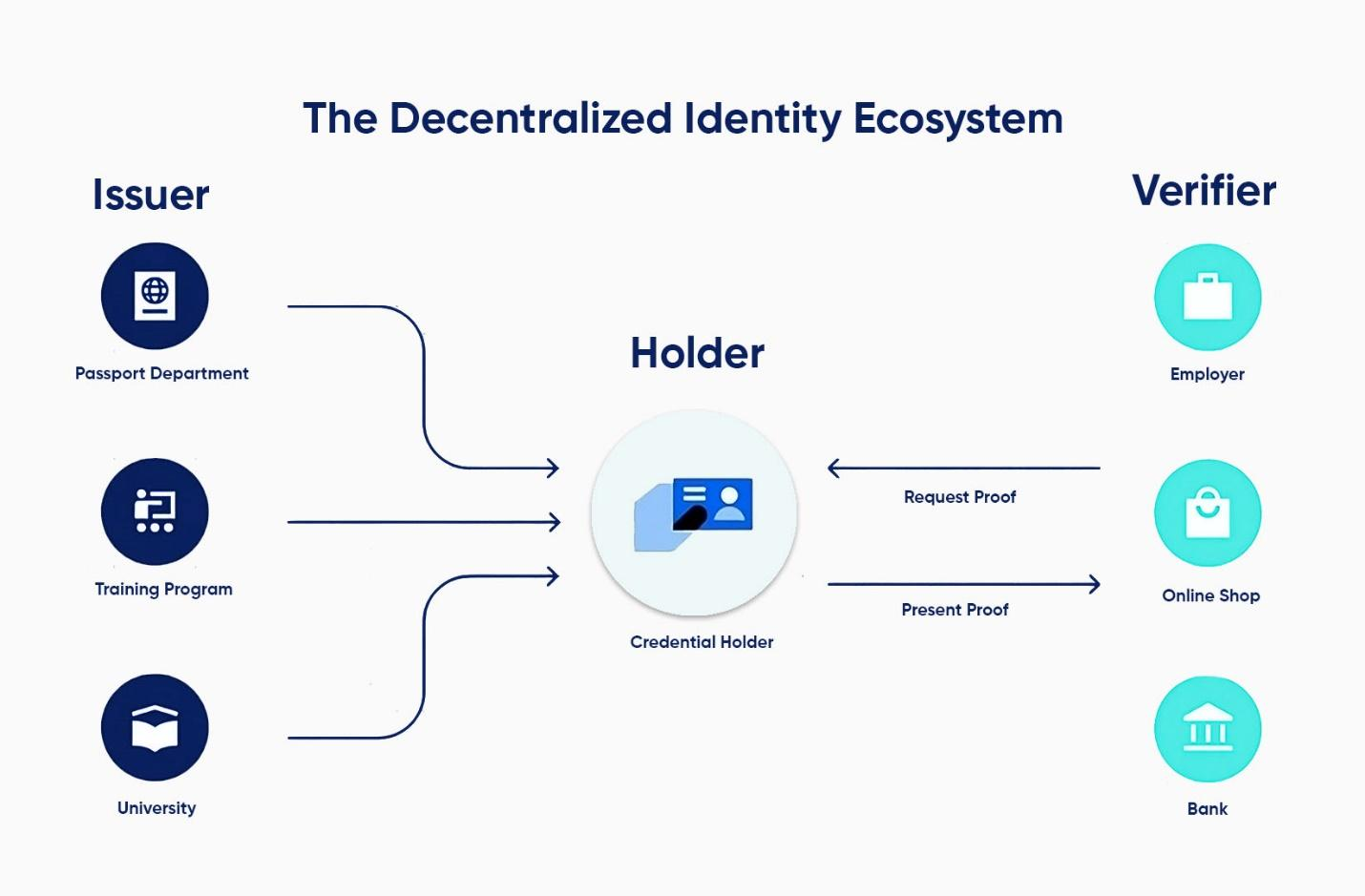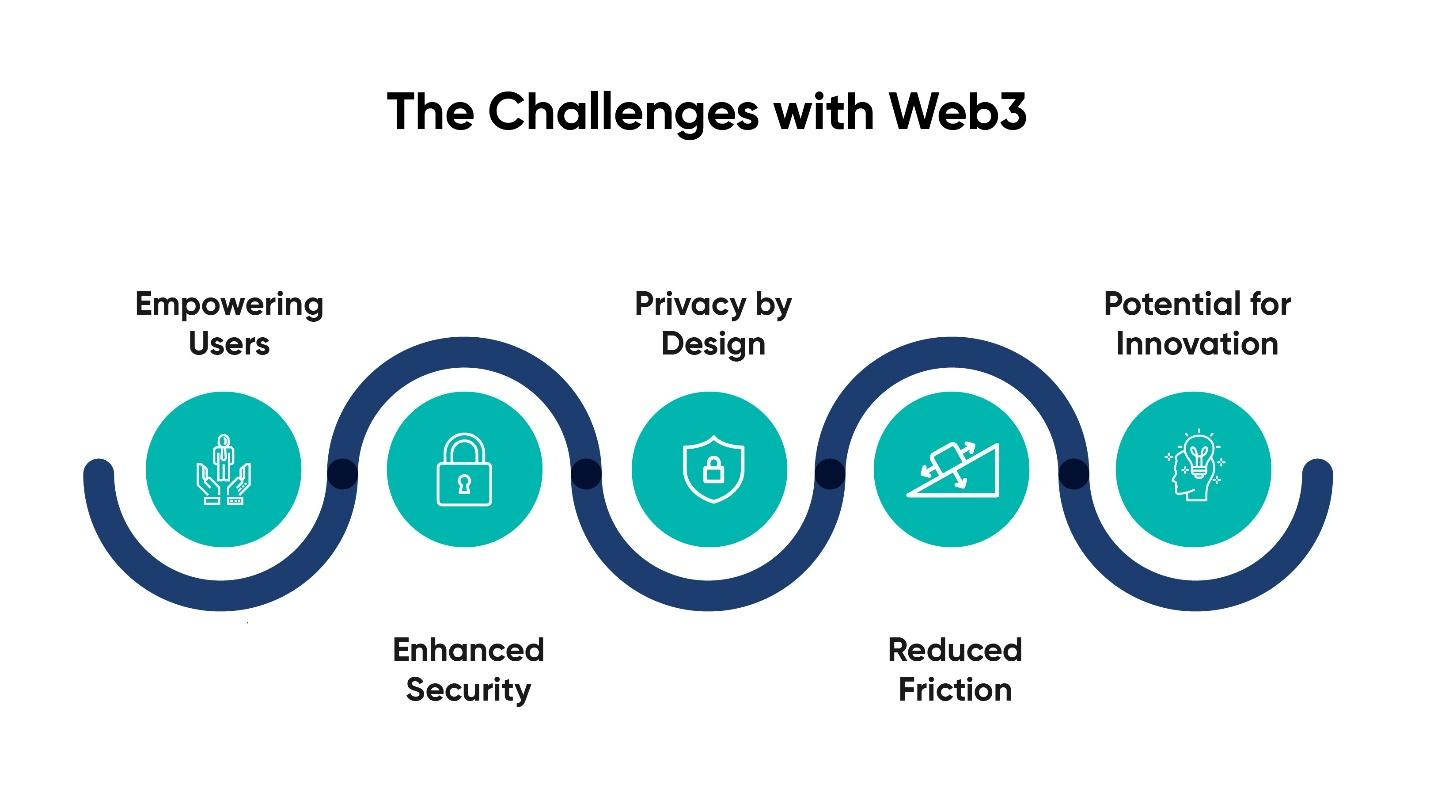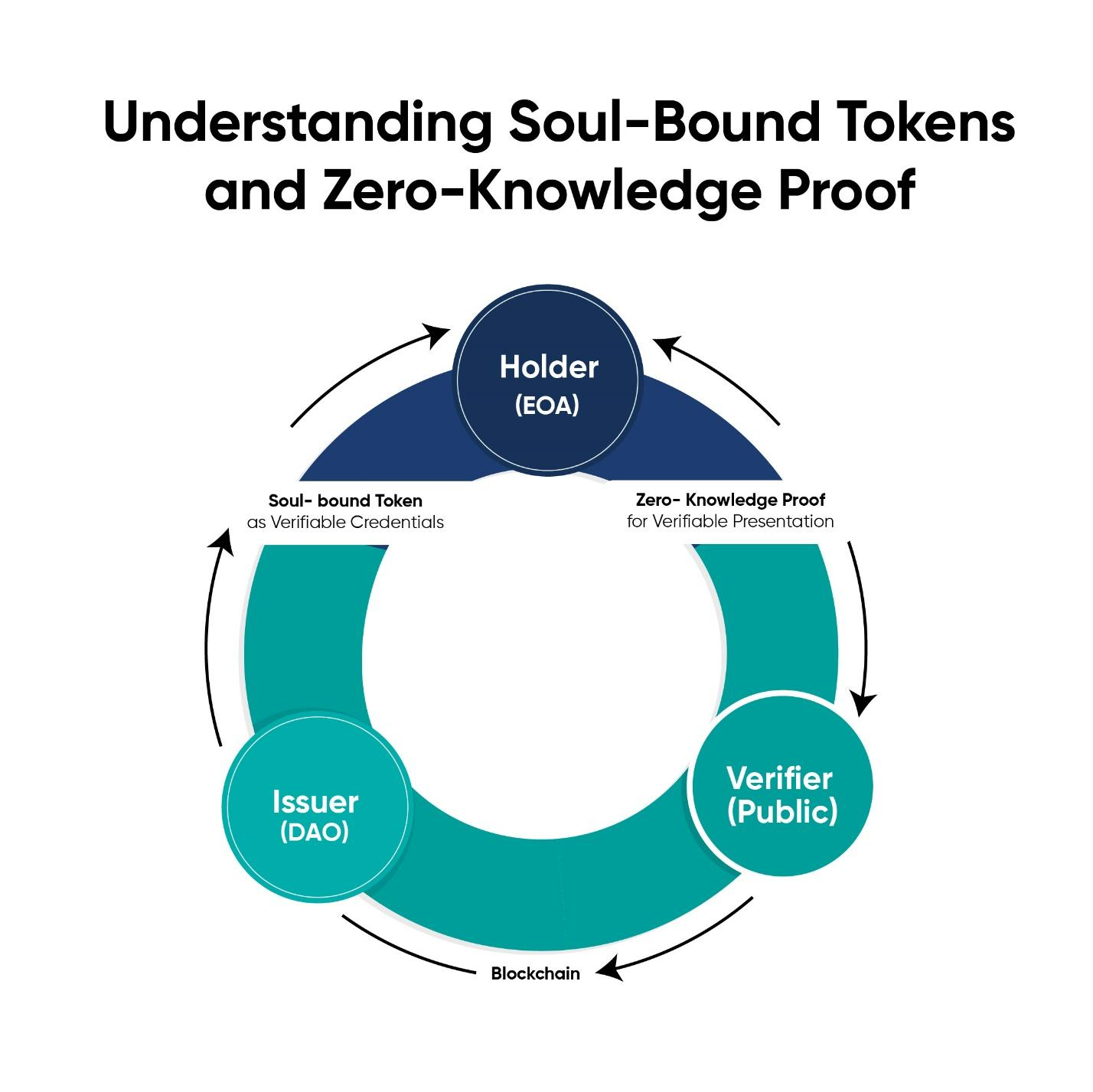The emergence of Web3 has brought transformative changes to digital ownership and authentication, with decentralized identity systems playing a pivotal role in ensuring security, privacy, and trust. As the world moves toward a decentralized internet, the interplay between decentralized identity and digital assets creates the foundation for seamless and secure Web3 investments.
Understanding Decentralized Identity in Web3
In the evolving landscape of Web3, decentralized identity emerges as a groundbreaking solution, empowering individuals to control their personal data without relying on centralized authorities like governments or corporations. Unlike traditional identity systems that store data on centralized servers prone to breaches, decentralized identity systems leverage blockchain technology to create unique, immutable identifiers. These identifiers enable users to authenticate themselves securely across platforms, maintain privacy, and retain full ownership of their data.
Key Features of Decentralized Identity
Ownership of Data
Decentralized identity prioritizes self-sovereignty, giving users complete control over their digital identities. This eliminates the need to entrust sensitive data to third-party organizations, reducing risks of misuse or unauthorized sharing. For instance, rather than storing your ID information on multiple platforms like banks, social networks, and healthcare providers, decentralized identity allows you to share only the necessary credentials directly from your blockchain wallet.
Real-World Example: Imagine verifying your age for an online purchase without disclosing your full date of birth. A decentralized identity system can confirm that you meet the age requirement while keeping the rest of your data private.
Enhanced Security
By utilizing blockchain’s cryptographic features, decentralized identity ensures that credentials are tamper-proof and highly secure. Unlike traditional systems, where a breach could expose millions of records, decentralized identities distribute data across a blockchain, making it virtually impossible for hackers to alter or steal.
Example: If you use a blockchain wallet tied to your decentralized identity to access a financial platform, the platform can verify your credentials without the risk of storing your sensitive information on its servers.
Interoperability Across Platforms
Decentralized identities are designed to be interoperable, meaning they can function seamlessly across multiple Web3 platforms. Whether you’re logging into a decentralized finance (DeFi) protocol, purchasing an NFT, or accessing a tokenized real-world asset (RWA), a single decentralized identity can handle all your authentication needs.
Practical Use Case: A global digital asset consulting firm might help clients manage diverse portfolios by ensuring their decentralized identity is compatible with multiple blockchains, enabling efficient asset management across different ecosystems.
Why Decentralized Identity Matters in Web3
Decentralized identity systems are more than a technical innovation; they address fundamental challenges in digital ownership and asset management. Their importance in the Web3 ecosystem lies in their ability to:
Empower Individual Ownership
Ownership of identity data is a cornerstone of Web3’s ethos. In traditional systems, users often lose control over their information after sharing it with third parties. Decentralized identity eliminates this dependency by enabling individuals to retain full control, aligning with the broader decentralized finance movement.
Example: A blockchain asset investments consultant could help an investor manage their identity credentials, ensuring secure access to platforms handling tokenized real estate or altcoin investment options.
Provide Robust Security
The tamper-proof nature of blockchain technology makes decentralized identity a powerful tool against fraud and cyberattacks. With cryptographic verification, credentials can be securely authenticated without exposing sensitive details, reducing the risks of phishing and data breaches.
Illustration: A digital asset management consultant might use decentralized identity to ensure that their clients’ credentials are protected while accessing DeFi platforms or high-yield staking protocols.
Streamline Interoperability
Managing multiple accounts and passwords is cumbersome and prone to security risks. Decentralized identity offers a unified solution, allowing users to interact with various Web3 applications using a single, secure credential. This simplifies asset management and enhances user experience across platforms.
Use Case: A Stablecoin investment consultant could advise investors on how to link their decentralized identity to wallets and DeFi platforms, enabling secure participation in yield-generating protocols without repeated credential setups.
The Role of Decentralized Identity in Managing Web3 Assets
Web3 assets, including cryptocurrencies, NFTs, and tokenized real-world assets (RWAs), have revolutionized how value is exchanged and stored. However, their widespread adoption hinges on secure and verifiable ownership mechanisms. Decentralized identity provides a robust solution to critical challenges like fraud, unauthorized access, and asset mismanagement. By combining blockchain’s transparency with cryptographic security, decentralized identity systems enhance trust and usability in the Web3 ecosystem.
Enhanced Security for Digital Assets
Traditional asset ownership systems rely on centralized databases, which are vulnerable to hacking and breaches. Decentralized identity, on the other hand, secures ownership by linking identities directly to blockchain wallets. These wallets act as secure gateways, enabling authentication without exposing sensitive personal data.
Example: A global digital asset consulting firm might recommend implementing decentralized identity systems to secure tokenized real estate. By linking a buyer’s identity to their digital wallet, unauthorized transactions are nearly impossible, ensuring that ownership is tamper-proof and verifiable.
Decentralized identity also enables multi-factor authentication, adding an additional layer of security for high-value transactions. For example, a bitcoin investment consultant could assist investors in integrating biometric or hardware key authentication for accessing their crypto wallets, further safeguarding assets.
Simplified Authentication Processes
One of the key pain points for users engaging with multiple DeFi platforms is the need to manage numerous accounts and passwords. Decentralized identity simplifies this by enabling a single credential to access various blockchain-based financial services. This credential, stored in a secure digital wallet, streamlines interactions while maintaining user privacy.
Use Case: A cryptocurrency investment consultant could help clients manage their diversified crypto portfolios using decentralized identity systems. By linking all portfolio accounts to a single identity, users no longer need to juggle multiple login credentials, reducing both complexity and risk.
Practical Impact: Decentralized identity makes it easier for investors to access DeFi lending platforms, stake tokens, or participate in NFT marketplaces. This seamless experience encourages broader participation in Web3 investments, particularly among newcomers unfamiliar with blockchain technology.
Transforming Trust in Web3 Investments
Decentralized identity systems play a pivotal role in establishing trust within the Web3 ecosystem. By enabling secure, transparent, and tamper-proof verification processes, they address core concerns related to ownership, fraud prevention, and compliance.
Key Advantages
Self-Sovereign Ownership
With decentralized identity, investors retain full control over their asset ownership credentials, eliminating the need for intermediaries. This reduces dependency on third-party validators and ensures that users are the ultimate authority over their digital assets.
Example: An NFT artist using decentralized identity can mint tokens that directly link back to their verified identity, ensuring buyers can trace authenticity without relying on platform-specific guarantees.
Fraud Prevention
Decentralized systems reduce the risk of identity theft and unauthorized transactions. By using blockchain’s cryptographic security, these systems make it nearly impossible to tamper with ownership records.
Illustration: A digital asset management consultant might recommend decentralized identity tools to prevent fraudulent transfers of tokenized art or real estate assets, ensuring that ownership remains secure.
Regulatory Compliance
Decentralized identity systems can integrate compliance protocols to meet regulatory requirements, fostering institutional trust in blockchain-based assets. Consulting with firms specializing in digital asset consulting for compliance helps ensure that identity solutions align with local and international regulations.
Real-World Impact: Regulatory-compliant decentralized identity systems encourage traditional financial institutions to enter the Web3 space, bringing legitimacy and broader adoption to blockchain-based assets.

Applications of Decentralized Identity in Web3 Investments
NFT Ownership and Management
The rise of non-fungible tokens (NFTs) has created a demand for robust identity solutions to verify authenticity and ownership. Decentralized identities enable both creators and buyers to prove the provenance of NFTs, building trust in a market plagued by counterfeits.
Practical Example: Artists minting NFTs can attach their decentralized identity credentials to each token. Buyers can then verify the token’s origin and authenticity directly on the blockchain. This process also benefits digital asset management companies, which can use decentralized identity to build transparency and trust in NFT markets.
DeFi Access and Authentication
Decentralized finance (DeFi) platforms are increasingly adopting decentralized identities to authenticate users and manage permissions without compromising privacy. This approach streamlines access while enhancing security for participants.
Case Study: A Stablecoin investment consultant might assist clients in accessing high-yield DeFi protocols by integrating decentralized identity with their wallets. This integration not only secures transactions but also simplifies participation by reducing the need for repetitive identity verification across platforms.

The Intersection of Decentralized Identity and Macroeconomic Trends
Macroeconomic factors such as inflation, interest rate fluctuations, and evolving regulatory landscapes profoundly impact blockchain and digital asset markets. These forces shape investor behavior, asset valuations, and market accessibility. In this dynamic environment, decentralized identity systems act as a stabilizing force, offering resilience and adaptability to navigate these macroeconomic shifts.
Inflation Hedging with Decentralized Identity
Inflation erodes the value of fiat currencies, prompting investors to seek alternative assets that can preserve or grow their wealth. Decentralized identity plays a critical role in enabling secure access to inflation-resistant assets like tokenized gold, tokenized real estate, and other tangible assets represented on blockchain platforms.
Why It Matters:
Decentralized identity systems ensure that users can authenticate their ownership of inflation-hedged assets without intermediaries, reducing risks like fraud or unauthorized transactions. This streamlined process increases investor confidence and facilitates more secure portfolio diversification.
Practical Example:
A blockchain asset investments consultant might advise investors to use decentralized identity tools to access tokenized gold assets such as PAX Gold (PAXG) or Tether Gold (XAUT). These blockchain-based tokens are backed by physical gold and provide a hedge against inflation without the need for traditional storage or management. By securing their holdings through decentralized identity, investors can authenticate ownership and trade assets seamlessly across platforms.

Additional Use Case:
Tokenized real estate linked to decentralized identity systems allows investors to own income-generating properties without geographic or logistical constraints. As rental yields adjust with inflation, these assets provide a reliable revenue stream while safeguarding against currency devaluation.
Regulatory Adaptability
Regulatory policies governing digital assets and blockchain technologies are constantly evolving. While stricter compliance requirements can pose challenges, they also present opportunities for decentralized identity systems to shine. By integrating regulatory compliance mechanisms, decentralized identity enables investors to maintain access to Web3 assets while adhering to legal standards.
How It Works:
Decentralized identity systems provide robust compliance features, including Know Your Customer (KYC) and Anti-Money Laundering (AML) protocols, without compromising user privacy. This functionality allows investors to securely engage with DeFi platforms, tokenized asset markets, and blockchain-based financial products even amidst regulatory uncertainty.
Example:
RWA DeFi investment consultants often recommend decentralized identity solutions to help clients navigate complex regulatory environments. For instance, investors dealing with tokenized real-world assets (RWAs) may face restrictions based on jurisdiction or asset class. By integrating decentralized identity into their strategies, these consultants enable seamless authentication and compliance, ensuring uninterrupted access to investment opportunities.
Real-World Impact:
Consider an investor exploring tokenized agricultural commodities in a region with fluctuating trade policies. By leveraging decentralized identity, they can demonstrate compliance with local regulations while protecting their personal data, enabling smoother transactions and greater confidence in the market.
The Role of Decentralized Identity in Broader Macroeconomic Trends
Beyond inflation and regulations, decentralized identity systems adapt to other macroeconomic factors, such as interest rate changes and global economic uncertainties.
Interest Rate Sensitivity:
As central banks adjust interest rates, asset prices—both traditional and blockchain-based—experience shifts. Decentralized identity allows investors to quickly pivot their strategies by enabling seamless access to yield-generating DeFi platforms or tokenized income-generating assets.
Illustration:
A digital asset strategy consulting firm might recommend using decentralized identity to connect investors to high-yield DeFi protocols during periods of low interest rates in traditional markets. By securing access through decentralized identity, investors can take advantage of yield farming or staking opportunities without compromising security.
Global Economic Uncertainty:
In times of geopolitical or economic instability, decentralized identity systems enable secure, borderless access to diverse asset classes, providing a hedge against localized risks. Assets such as tokenized commodities or cryptocurrency-backed loans become more accessible, empowering investors to diversify their portfolios effectively.
Use Case:
A global digital asset consulting firm might leverage decentralized identity solutions to help clients invest in cross-border tokenized assets. These systems ensure compliance with international regulations while maintaining the privacy and security of user data, fostering trust and expanding global investment opportunities.
Decentralized Identity as a Pillar of Resilience
As macroeconomic trends continue to shape the financial landscape, decentralized identity systems emerge as indispensable tools for investors navigating the complexities of Web3 assets. By providing secure, compliant, and adaptable solutions, decentralized identity not only mitigates risks associated with inflation, regulation, and interest rate changes but also unlocks new opportunities for portfolio growth.
For investors seeking expertise in this evolving field, partnering with a digital asset management consultant or a real-world assets crypto investment consultant ensures that their strategies are both future-proof and aligned with macroeconomic realities. The intersection of decentralized identity and macroeconomic trends underscores the potential of blockchain technology to redefine resilience and accessibility in modern finance.
While decentralized identity systems offer transformative benefits for securing Web3 assets, they face significant hurdles that require innovative strategies to overcome. These challenges span technical, educational, and structural domains, each demanding tailored solutions to ensure successful implementation and adoption.
Scalability: Meeting the Demands of Mass Adoption
One of the primary challenges of decentralized identity systems is scalability. As more users and organizations adopt these systems, the underlying infrastructure must handle increased demand without compromising speed, security, or reliability.
Challenges:
- The sheer volume of transactions and identity verifications in a global Web3 ecosystem can overwhelm blockchain networks, leading to bottlenecks.
- High transaction fees on popular blockchains like Ethereum could limit access to decentralized identity solutions for smaller investors or startups.
Solutions:
- Collaboration with global digital asset consulting firmsensures that decentralized identity systems adopt scalable architectures, such as Layer 2 solutions or sidechains, to enhance throughput.
- Transitioning to more energy-efficient and faster consensus mechanisms, like proof-of-stake or zero-knowledge proofs, further supports scalability.
- Investment in cross-chain bridges to distribute the load across multiple blockchains enables decentralized identities to function seamlessly in a diverse ecosystem.
Real-World Application:
Consultants specializing in digital asset portfolio management often recommend scalable identity solutions to enterprises exploring tokenized assets or DeFi platforms, ensuring smooth operations as user numbers grow.
2. User Education: Bridging the Knowledge Gap
Decentralized identity systems introduce a new paradigm in how individuals manage their digital presence, but the concept remains unfamiliar to many potential users and investors.
Challenges:
- Lack of awareness among retail investors about the importance of decentralized identity in protecting their digital assets.
- Misconceptions around the complexity of setting up and using decentralized identity systems deter widespread adoption.
Solutions:
- Blockchain and digital asset consulting servicesplay a crucial role in educating users about the practical benefits of decentralized identity. These firms organize workshops, create resources, and provide hands-on assistance to demystify the technology.
- Integrating user-friendly interfaces and simplified processes, such as one-click wallet integrations, makes decentralized identity more accessible to non-technical users.
Example:
A Stablecoin investment consultant might guide investors on using decentralized identity to securely access DeFi protocols, ensuring that they understand the added layers of protection and convenience.
Impact:
User education efforts not only accelerate adoption but also enhance the security of the broader Web3 ecosystem by reducing risks like phishing or unauthorized access.
3. Interoperability: Enabling Cross-Platform Functionality
To maximize their utility, decentralized identities must seamlessly function across various blockchains, platforms, and ecosystems. The lack of interoperability can limit their potential and create fragmented user experiences.
Challenges:
- Different blockchain networks often use unique standards and protocols, complicating the integration of decentralized identity systems.
- Without interoperability, users might face restrictions when attempting to authenticate ownership or access assets across multiple platforms.
Solutions:
- Platforms offering digital asset management servicesare developing standardized frameworks, such as Decentralized Identity Foundation (DIF) protocols, to promote compatibility across ecosystems.
- Adoption of blockchain-agnostic identity layers, like the Ethereum Name Service (ENS) or W3C’s Verifiable Credentials standard, ensures interoperability.
- Collaborations between real world assets crypto investment consultantsand technical teams enable the design of bridges and APIs that facilitate cross-platform functionality.
Real-World Example:
A digital asset management consultant could integrate decentralized identity systems with multiple DeFi platforms, enabling users to authenticate their wallets across Ethereum, Solana, and Binance Smart Chain without friction.

Future Prospects
The integration of decentralized identity into the Web3 investment landscape is set to unlock unprecedented opportunities for security, accessibility, and trust. As the technology matures, several key developments are likely to define its future.
Integration with AI: Personalized and Optimized Asset Management
The combination of decentralized identity systems and artificial intelligence (AI) tools will revolutionize how investors manage their Web3 assets.
How It Works:
AI-powered platforms can analyze transaction histories, investment goals, and risk tolerances linked to decentralized identities to provide tailored recommendations.
Practical Example:
A digital asset strategy consulting firm might integrate AI-driven insights to guide users on the best DeFi protocols, yield opportunities, or tokenized asset classes to pursue based on their unique profiles.

Benefits:
- Enhanced decision-making through predictive analytics.
- Proactive identification of fraud or suspicious activities by monitoring decentralized identity-linked wallets.
Institutional Adoption: Building Trust and Scale
As regulatory clarity improves, decentralized identity systems will attract institutional investors seeking secure and compliant access to Web3 assets.
Key Drivers:
- Decentralized identity systems reduce operational risks by providing tamper-proof ownership verification and streamlined KYC/AML compliance.
- Institutions will rely on portfolio management consultantsand hedge fund investment companies to integrate these systems into their workflows, ensuring scalability and security.
Example:
A hedge fund utilizing tokenized assets could implement decentralized identity solutions to authenticate ownership and automate compliance checks, reducing costs and enhancing trust with regulators and clients alike.
Growth of Tokenized Assets: Redefining Ownership
Decentralized identity will play a pivotal role in the exponential growth of tokenized assets, including real estate, art, and commodities.
Opportunities:
- By linking tokenized assets to decentralized identities, users gain a direct and immutable proof of ownership.
- Simplified cross-border transactions through identity-linked smart contracts reduce logistical barriers and enhance asset liquidity.
Case Study:
Real world asset consultants might help facilitate the tokenization of international real estate, allowing investors from multiple jurisdictions to purchase fractional ownership securely through decentralized identity systems.
Emerging Trends:
Tokenized renewable energy credits and carbon offsets will gain traction, with decentralized identity systems ensuring transparency and traceability in environmental markets.
Building the Foundation of Web3 Investment
Decentralized identity systems are revolutionizing how digital assets are managed, authenticated, and secured in the Web3 era. By addressing challenges such as fraud, accessibility, and compliance, they pave the way for broader adoption and trust in blockchain-based investments.
For investors looking to navigate this transformative space, working with specialists like bitcoin investment consultants, portfolio management consultants, and DeFi finance consulting services is essential to unlock the full potential of Web3 assets.
As decentralized identity solutions continue to evolve, they will undoubtedly remain at the heart of Web3 investments, shaping the future of finance and digital ownership.
Secure Your Financial Future with Kenson Investments
Discover the power of informed decision-making in the evolving digital asset landscape. Partner with Kenson Investments to explore innovative strategies, gain valuable insights, and confidently navigate the world of Web3 investments.
Disclaimer: The information provided on this page is for educational and informational purposes only and should not be construed as financial advice. Crypto currency assets involve inherent risks, and past performance is not indicative of future results. Always conduct thorough research and consult with a qualified financial advisor before making investment decisions.
“The crypto currency and digital asset space is an emerging asset class that has not yet been regulated by the SEC and US Federal Government. None of the information provided by Kenson LLC should be considered as financial investment advice. Please consult your Registered Financial Advisor for guidance. Kenson LLC does not offer any products regulated by the SEC including, equities, registered securities, ETFs, stocks, bonds, or equivalents”














